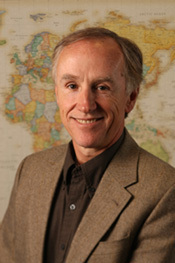
The social change fervor sweeping through Egypt and the Middle East is one of the most dramatic expressions of “people power” in history, says David Cortright, director of policy studies at the University of Notre Dame’s Kroc Institute for International Peace Studies.
“Never before have people in the region mobilized in such vast numbers to shake off the chains of autocracy. The ramifications of these events are widening every day. Algeria has announced reforms, Jordan’s King Abdullah has dismissed his government, and huge rallies continue in Yemen. History seems to be turning on a hinge.”
Cortright has taught nonviolent social change and peace studies at Notre Dame since 1989. He is the author or editor of 17 books, including “Peace: A History of Movements and Ideas” and “Uniting Against Terror: Cooperative Nonmilitary Responses to the Global Terrorist Threat," with George A. Lopez.
“The protests have been mostly nonviolent,” Cortright says. “The organizers and crowds in Cairo and other cities seem to know instinctively that armed struggle is futile. Many demonstrators have been attacked by thugs and security forces, but few have committed hostile acts. Reaction has come only after persistent physical attack by Mubarak supporters.
“The demonstrators are wise to emphasize nonviolent discipline, Cortright says. “Empirical studies show that civil resistance is twice as effective as armed struggle in achieving significant political change. Nonviolence is a practical requirement for winning the sympathy of bystanders and encouraging loyalty shifts within the military and police. In the velvet revolutions of eastern Europe and the ‘colored revolutions’ of Ukraine and other former Soviet republics, resisters won in part by convincing the military to remain neutral or side with the people.
“That lesson is evident in Tunisia,” Cortright says, "where the police openly joined the ranks of the resisters. In Egypt, demonstrators were urged to ‘hug a soldier’ as a way of saying that the struggle is against the dictatorship not rank and file soldiers. Some protestors waved from atop tanks. The military declared it would not use force ‘against our great people.’
“It’s too early to tell whether these events will lead to genuine democracy and a more peaceful future for the region,” Cortright says. “The Muslim Brotherhood and other Islamist parties are likely to assume a larger political role, but this need not be a cause for alarm. Rather than spreading extremism, as some fear, a more inclusive political process in Egypt and other Arab countries might reduce the appeal of extremism—allowing people to voice their grievances through political rather than military means.”
Media Advisory Cortright’s comments may be used in whole or in part. He is available for interviews and can be reached at 574-631-8536, dcortrig@nd.edu or visit his blog.